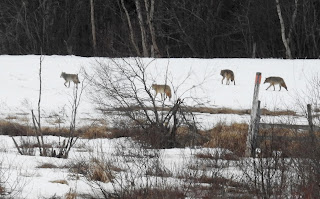NATURE MONCTON INFORMATION LINE, March 02, 2017 (
Thursday )
To respond by e-mail, please address your message to the
information line editor, nelson@nb.sympatico.ca .
Please advise if any errors are noted in wording or photo labeling.
Edited by: Nelson Poirier nelson@nb.sympatico.ca
Transcript by: Brian Stone bjpstone@gmail.com
Info Line # 506-384-6397 (384-NEWS)
** Anna Tucker got an underwing flight photo of a RED-TAILED HAWK [Buse à
queue rousse] recently. It may be a documentary photo, but it shows the dark bar
on the leading edge of the wing next to the body known as the patagial bar that
is specific to the Red-tailed Hawk in adult and juvenile plumage.
** Jean Paul Leblanc reports that the male NORTHERN PINTAIL [Canard pilet]
and the two CANADA GEESE [Bernaches du Canada] continue to
overwinter at the Bouctouche lagoon.
** Doreen Rossiter leaves a nice summary of winter bird
activity around her Alma yard. She comments that bird patron numbers have been
high, but have been all expected species. AMERICAN GOLDFINCH
[Chardonneret jaune] topped the number count with almost a hundred every day
that included one to three PINE SISKINS [Tarin des pins].
Three AMERICAN ROBINS [Merle d'Amérique]
overwintered. DARK-EYED JUNCO [Junco ardoisé] numbers were low at two to
three and not every day. AMERICAN TREE SPARROWS[Bruant hudsonien] at twelve to
fifteen but they have dropped back with the warm spell. BLUE JAYS [Geai bleu]
came and went with six some days and none other days. Woodpeckers were rare, but
a pair showed up at suet on Wednesday.
RING-NECKED PHEASANTS [Faisan de Colchide] with three males and seven females, and the dominant male now getting up on high places in the yard and starting to wing flap and crow. Last year it started pecking at its reflection in a sunroom window on March 12th and continued to do so until August. Three WHITE-THROATED SPARROWS [Bruant à gorge blanche] overwintered and the first two COMMON GRACKLES [Quiscale bronzé] of Spring arrived on Wednesday. RAVENS [Grand corbeau] and AMERICAN CROWS [Corneille d'Amérique] are into aerial conflicts and the BOHEMIAN WAXWINGS [Jaseur boréal] seem to come and go. The one surprise with all the small birds present was the complete absence of Hawks or a Shrike.
RING-NECKED PHEASANTS [Faisan de Colchide] with three males and seven females, and the dominant male now getting up on high places in the yard and starting to wing flap and crow. Last year it started pecking at its reflection in a sunroom window on March 12th and continued to do so until August. Three WHITE-THROATED SPARROWS [Bruant à gorge blanche] overwintered and the first two COMMON GRACKLES [Quiscale bronzé] of Spring arrived on Wednesday. RAVENS [Grand corbeau] and AMERICAN CROWS [Corneille d'Amérique] are into aerial conflicts and the BOHEMIAN WAXWINGS [Jaseur boréal] seem to come and go. The one surprise with all the small birds present was the complete absence of Hawks or a Shrike.
** Brian Coyle and I had one of the best COYOTE [Coyote]
experiences we've ever been fortunate to be part of on Wednesday morning. Brian
had spotted Coyote scat and tracks foraging on apples a few days before and
found a young calf that had died and been put out by a local farmer in a back
field. Brian assumed that the Coyotes would find it and went back through the
wooded area to the back field the next day to get close enough to see two
Coyotes checking it out. He returned the next day to see three Coyotes there.
After he called to tell me about it we decided to make an early morning run on
Wednesday morning. Conditions then were very gray and threatening rain but the
wind was in the right direction for any animals that might be there to not catch
our scent too quickly.
We got all we could ever hope for with six Coyotes present
in the area. They would not allow us to get close but a long zoom camera did get
some documentary photos of the memorable scenario of which maybe too many are
attached, but it was hard to hold any back. One of the six seemed to be the
group leader and seemed to be very dark in color. The pelage variability was
quite noticeable. There were also two RED-TAILED HAWKS [Buse à queue
rousse] that Brian sees there, and hears one vocalize in flight most days. We
did see one of them on Wednesday, but it did not vocalize for us. All a very
memorable experience that will never be forgotten thanks to Brian Coyle who
after a few visits knew the best route to get to within binocular distance
without being detected.
Nelson Poirier,
Nature
Moncton
CANADA GEESE. FEB 28,2017. JP LEBLANC
COYOTES.MARCH 1,2017. NELSON
POIRIER
COYOTES.MARCH 1,2017. NELSON POIRIER
COYOTES.MARCH 1,2017. NELSON POIRIER
COYOTE.MARCH 1,2017. NELSON POIRIER
COYOTE.MARCH 1,2017. NELSON POIRIER
COYOTES.MARCH 1,2017. NELSON POIRIER
NORTHERN PINTAIL. FEB 28, 2017. JP LEBLANC
RED-TAILED HAWK.FEB 26, 2017.ANNA TUCKER








